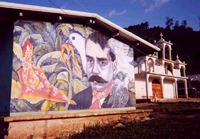Today's global movement for change - networked, with many voices, democratic - demands an equivalent type of engagement from observers. Paul Kingsnorth has travelled from Mexico to Italy, from Bolivia to South Africa and from Brazil to West Papua to track the ways that diverse social, political and environmental struggles combine in the search for a world of fairness and freedom. His interview with Caspar Henderson of openDemocracy starts in Chiapas, Mexico.
openDemocracy: How would you describe the new global movement which you encountered on your travels?
Paul Kingsnorth: Some people call it the anti-globalisation movement. Some call it the anti-capitalist movement. Some call it the global justice movement. Whatever you call it, is the gathering a mass of people around the world who are increasingly dissatisfied with the way the current system works, but crucially they are trying to find new answers.
The comfortable assumptions of the Old Left appear to have collapsed. It's not enough any more to talk about state socialism. It's not enough just to talk about revolutions and vanguards and masses and all this kind of traditional stuff, that even if it's desirable it doesn't seem to work any more, so what are we going to do? Most importantly, how are we going to work out democratic answers to the challenges of globalisation?
openDemocracy: Where did the movement start and why is it new?
 Paul Kingsnorth: Many people say it started with the Zapatista uprising in the southern Mexican state of Chiapas in 1994 - sometimes called the first 'postmodern revolution'. What does that mean? The Zapatistas are an indigenous Indian peasant-based guerilla organisation. They staged an uprising against the Mexican state. At first glance that doesn't seem terribly unusual when you look at the last few decades in Latin America. But the way that they did it, and what they actually wanted, was stunningly different from a lot of what had happened before.
Paul Kingsnorth: Many people say it started with the Zapatista uprising in the southern Mexican state of Chiapas in 1994 - sometimes called the first 'postmodern revolution'. What does that mean? The Zapatistas are an indigenous Indian peasant-based guerilla organisation. They staged an uprising against the Mexican state. At first glance that doesn't seem terribly unusual when you look at the last few decades in Latin America. But the way that they did it, and what they actually wanted, was stunningly different from a lot of what had happened before.
The Zapatistas didn't aim to seize the state. They didn't aim to create a vanguard which other people could follow. They didn't aim to seize power from the existing elite and hand it to themselves. What they wanted to do was devolve power downwards. They talked about democracy rather that the dictatorship of the proletariat. Through all of this, they were, and they still are, an indigenous peasant movement, which has suffered enormously at the hands of the Mexican elites.
The Zapatistas didn't aim to seize the state... What they wanted to do was devolve power downwards.
openDemocracy: What did you want to find out on your visit?
Paul Kingsnorth: There are two parts to what is going on. There are the guerillas who actually staged the uprising, who are hiding in the mountains, and refusing to negotiate with government, because they feel the government has betrayed them. And then there are an estimated quarter of a million people living in the various indigenous villages across Chiapas. These are the Zapatista communities. They've declared autonomy from the government. They run their own affairs, and they are going to keep doing that, they say, until the government gives them what they want in terms of new indigenous rights laws.
The communities are very remote. They're still extremely traditional. They speak many different languages and have different traditions. Since 1994, when they declared autonomy from the government and threw out all the local government officials, they have been running things by themselves. They run their community through village meetings, and determine their own laws and punishments. What they're trying to fuse what we in the rich industrial countries would think of as 'modern' notions of democracy and rights with indigenous notions. So for example, they have a women's revolutionary law, which decrees that women are equal in everything.
 A Zapatista mural on a Chiapas school
A Zapatista mural on a Chiapas school
- and a church in the background
It's a fascinating place to live, precisely because the communities really are in control of their own affairs. At the same time, there is a lot of poverty - partly because of the exclusion people there have suffered for decades and indeed centuries, and partly because they refuse to accept any money from the government. Since they declared autonomy they won't accept money for schools, transport and other services normally provided from the centre.
So there is an enormous amount of hope because they are controlling their own lives. At the same time there is frustration because they don't feel that they are getting what they want from the government, and they are still suffering from the terrible poverty which made them rise up in the first place.
Next: From Genoa to Cochabamba